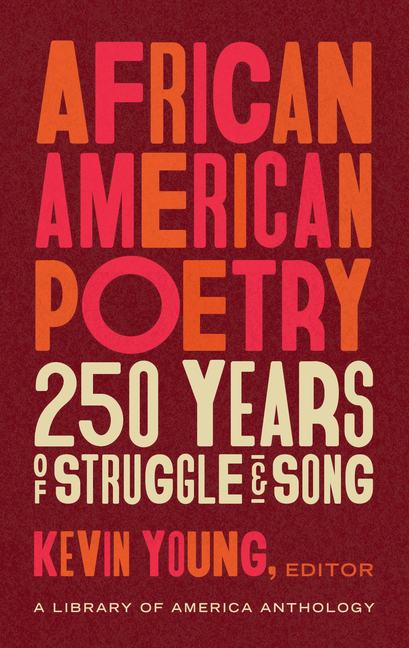Book Description
for African American Poetry by Kevin Young
From the Publisher
A literary landmark: the biggest, most ambitious anthology of Black poetry ever published, gathering 250 poets from the colonial period to the present
Across a turbulent history, from such vital centers as Harlem, Chicago, Washington, D.C., Los Angeles, and the Bay Area, Black poets created a rich and multifaceted tradition that has been both a reckoning with American realities and an imaginative response to them. Capturing the power and beauty of this diverse tradition in a single indispensable volume, African American Poetry reveals as never before its centrality and its challenge to American poetry and culture.
One of the great American art forms, African American poetry encompasses many kinds of verse: formal, experimental, vernacular, lyric, and protest. The anthology opens with moving testaments to the power of poetry as a means of self-assertion, as enslaved people like Phillis Wheatley and George Moses Horton and activist Frances Ellen Watkins Harper voice their passionate resistance to slavery. Young’s fresh, revelatory presentation of the Harlem Renaissance reexamines the achievements of Langston Hughes and Countee Cullen alongside works by lesser-known poets such as Gwendolyn B. Bennett and Mae V. Cowdery. The later flowering of the still influential Black Arts Movement is represented here with breadth and originality, including many long out-of-print or hard-to-find poems.
Here are all the significant movements and currents: the nineteenth-century Francophone poets known as Les Cenelles, the Chicago Renaissance that flourished around Gwendolyn Brooks, the early 1960s Umbra group, and the more recent work of writers affiliated with Cave Canem and the Dark Room Collective. Here too are poems of singular, hard-to-classify figures: the enslaved potter David Drake, the allusive modernist Melvin B. Tolson, the Cleveland-based experimentalist Russell Atkins. This Library of America volume also features biographies of each poet and notes that illuminate cultural references and allusions to historical events.
Across a turbulent history, from such vital centers as Harlem, Chicago, Washington, D.C., Los Angeles, and the Bay Area, Black poets created a rich and multifaceted tradition that has been both a reckoning with American realities and an imaginative response to them. Capturing the power and beauty of this diverse tradition in a single indispensable volume, African American Poetry reveals as never before its centrality and its challenge to American poetry and culture.
One of the great American art forms, African American poetry encompasses many kinds of verse: formal, experimental, vernacular, lyric, and protest. The anthology opens with moving testaments to the power of poetry as a means of self-assertion, as enslaved people like Phillis Wheatley and George Moses Horton and activist Frances Ellen Watkins Harper voice their passionate resistance to slavery. Young’s fresh, revelatory presentation of the Harlem Renaissance reexamines the achievements of Langston Hughes and Countee Cullen alongside works by lesser-known poets such as Gwendolyn B. Bennett and Mae V. Cowdery. The later flowering of the still influential Black Arts Movement is represented here with breadth and originality, including many long out-of-print or hard-to-find poems.
Here are all the significant movements and currents: the nineteenth-century Francophone poets known as Les Cenelles, the Chicago Renaissance that flourished around Gwendolyn Brooks, the early 1960s Umbra group, and the more recent work of writers affiliated with Cave Canem and the Dark Room Collective. Here too are poems of singular, hard-to-classify figures: the enslaved potter David Drake, the allusive modernist Melvin B. Tolson, the Cleveland-based experimentalist Russell Atkins. This Library of America volume also features biographies of each poet and notes that illuminate cultural references and allusions to historical events.
Publisher description retrieved from Google Books.


